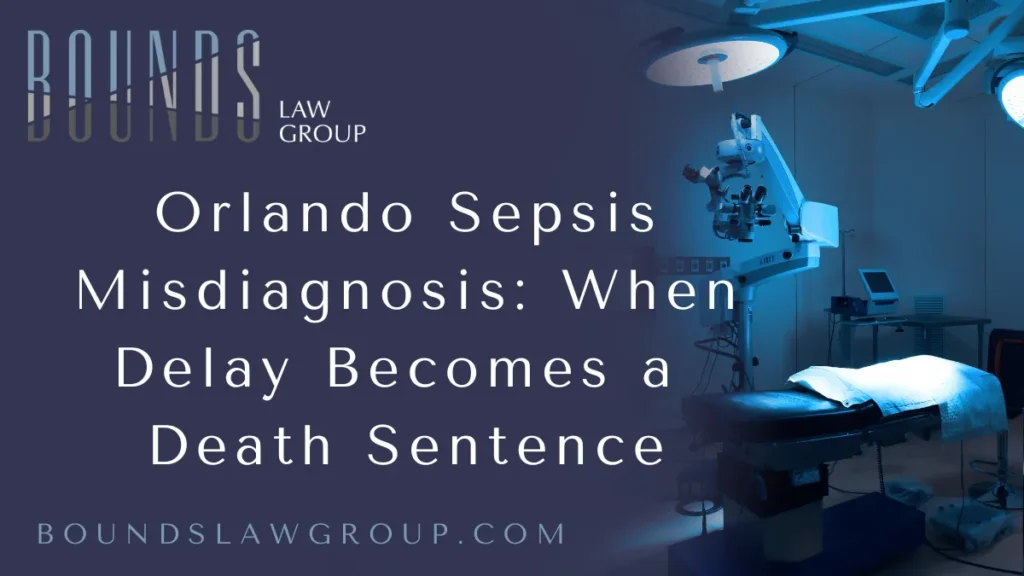
What Is Sepsis and Why Accurate Diagnosis Is Critical
Sepsis is a life-threatening condition caused by the body’s extreme response to infection. It can lead to tissue damage, organ failure, and death. The early stages may present symptoms like fever, confusion, increased heart rate, and low blood pressure—symptoms that mimic less serious conditions. However, any delay in treatment drastically increases the risk of permanent injury or fatality.
When emergency room doctors, general practitioners, or hospital staff overlook or dismiss sepsis signs, they put patients’ lives at risk. If your loved one suffered because of a delayed or inaccurate diagnosis, an Orlando sepsis misdiagnosis lawsuit with Bounds Law Group can help hold those accountable.
Complete our free case evaluation form or call us now at 877-644-5122 to schedule a consultation.
Common Causes of Sepsis Misdiagnosis in Orlando Medical Facilities
Several medical errors can lead to a sepsis misdiagnosis:
- Failure to recognize early warning signs such as fever, chills, elevated heart rate, or disorientation.
- Misdiagnosing sepsis as flu, food poisoning, or another less serious condition.
- Delays in ordering blood cultures or initiating antibiotics.
- Inadequate patient monitoring post-surgery or following hospital-acquired infections.
These failures are not mere accidents—they are breaches in the standard of care, which may qualify as medical malpractice. Pursuing an Orlando sepsis misdiagnosis lawsuit is essential to bring justice and to encourage better hospital protocols.

When Delay Turns Deadly: Real Lives Affected by Sepsis Misdiagnosis
Sepsis can evolve rapidly. A patient might walk into an ER with minor symptoms and be in septic shock hours later if not treated aggressively. Florida hospitals and urgent care centers that miss these critical windows can cost lives.
Families who pursue an Orlando sepsis misdiagnosis lawsuit often describe loved ones who deteriorated quickly, only to hear from another physician that “it should have been caught earlier.” This form of medical negligence is not just unacceptable—it’s actionable.
Do You Have Grounds for an Orlando Sepsis Misdiagnosis Lawsuit?
If you or someone you love has been harmed due to a sepsis misdiagnosis or delayed treatment, you may be entitled to compensation through an Orlando sepsis misdiagnosis lawsuit. Grounds for a case include:
- The medical provider failed to follow standard diagnostic protocols.
- There was a delay in initiating treatment, such as IV antibiotics.
- The patient was discharged prematurely or ignored after raising concerns.
- Sepsis led to extended hospitalization, organ damage, amputation, or death.
At Bounds Law Group, we can evaluate the details of your case, request medical records, and consult expert witnesses to determine the strength of your claim.
What Compensation Can You Recover in a Sepsis Misdiagnosis Case?
An Orlando sepsis misdiagnosis lawsuit can help you secure compensation for:
- Medical expenses (past and future)
- Lost wages or earning potential
- Pain and suffering
- Emotional distress
- Long-term care costs
- Wrongful death damages (in fatal cases)
Our legal team at Bounds Law Group is dedicated to helping victims and their families recover the full compensation they deserve.
Why Choose Bounds Law Group for Your Orlando Sepsis Misdiagnosis Lawsuit
At Bounds Law Group, we bring decades of medical malpractice litigation experience to every case. We specialize in high-stakes lawsuits involving delayed diagnosis, failure to treat, and hospital negligence. Our firm is uniquely equipped to handle Orlando sepsis misdiagnosis lawsuits with the seriousness and depth they demand.
We work with board-certified medical experts and aggressively challenge hospitals, clinics, and healthcare providers whose negligence causes irreparable harm. Our results speak for themselves—we have recovered millions in verdicts and settlements for victims across Florida.
Act Now—Time Limits Apply
Under Florida law, victims of medical malpractice, including sepsis misdiagnosis, typically have two years from the date of injury or discovery of negligence to file a claim. However, exceptions may apply. Waiting too long can jeopardize your ability to pursue justice.
Do not delay. If you suspect your case involves a misdiagnosis or treatment delay, consult with our firm immediately.

Preventing Sepsis Misdiagnosis: How Healthcare Providers Can Improve Patient Safety
While patients can pursue justice through an Orlando sepsis misdiagnosis lawsuit, the most effective way to address this issue is to prevent it from happening in the first place. Sepsis is a medical emergency that requires swift action, and healthcare providers have a responsibility to minimize the risk of misdiagnosis. Here are several ways that hospitals, doctors, and medical professionals can improve patient safety and reduce the incidence of sepsis misdiagnosis:
1. Enhanced Training for Early Sepsis Detection
Healthcare providers must be continuously educated on recognizing the early signs of sepsis. Since sepsis symptoms can be easily confused with other less severe conditions, training medical staff to identify these symptoms early is crucial. Comprehensive and ongoing training can ensure that doctors, nurses, and emergency responders are equipped to detect subtle warning signs of sepsis before it progresses.
2. Implementing Sepsis Protocols
Hospitals and healthcare facilities should adopt standardized sepsis protocols for immediate diagnosis and treatment. These protocols include rapid screening tools, blood culture tests, and the administration of antibiotics as soon as possible. Implementing such protocols across all departments—especially in emergency rooms—can drastically improve outcomes by catching sepsis before it leads to severe complications.
3. Improved Patient Monitoring
Effective monitoring of patients at high risk for sepsis is essential. Those who have recently undergone surgery, have a weakened immune system, or have chronic conditions are particularly vulnerable. Hospitals should invest in advanced monitoring equipment that tracks vital signs closely, alerting medical staff to any early changes in a patient’s condition that may indicate the onset of sepsis.
4. Streamlining Communication Between Medical Teams
One of the most common causes of sepsis misdiagnosis is poor communication between healthcare professionals. A lack of information exchange, especially between emergency room doctors, specialists, and nurses, can lead to missed diagnoses. Improving communication channels and using electronic health records effectively can ensure that all team members are aware of critical changes in a patient’s health status.
5. Post-Treatment Follow-up
Given the rapid progression of sepsis, a timely follow-up with patients post-treatment is essential. Discharge planning should include a review of symptoms that require urgent attention, including signs of infection or sepsis. Clear instructions about what to do if symptoms worsen or reappear can help patients get timely medical attention before it’s too late.
By focusing on these areas, healthcare providers can make significant strides toward reducing sepsis misdiagnosis and ultimately saving lives. It's important that medical institutions take proactive steps to recognize sepsis early, treat it promptly, and continuously improve their standards of care. When medical negligence leads to sepsis misdiagnosis, it is essential for victims to seek legal recourse, and Bounds Law Group is here to help guide you through the process.
Get the Legal Help You Deserve Today
If you or a loved one has suffered from a sepsis misdiagnosis, Bounds Law Group is here to help you take legal action. A lawsuit may not undo the harm, but it can offer justice, closure, and financial relief for your family.
Complete our free case evaluation form today or call us now at 877-644-5122 to speak with a member of our experienced medical malpractice legal team. Your voice deserves to be heard. Let us fight for the justice your case demands.
Sources
- Centers for Disease Control and Prevention (CDC) – Offers detailed information on the symptoms, causes, and treatment protocols for sepsis.
https://www.cdc.gov/sepsis/ - National Institutes of Health (NIH) – In-depth research and case studies on the progression and treatment of sepsis in hospital settings.
https://www.nih.gov/ - Agency for Healthcare Research and Quality (AHRQ) – Provides data and insights into medical errors, including diagnostic failures leading to sepsis.
https://www.ahrq.gov/

